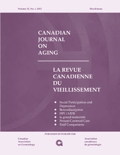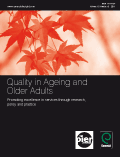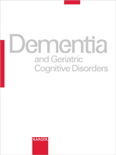
Current Geriatrics Reports
Scope & Guideline
Elevating discussions on aging with groundbreaking studies.
Introduction
Aims and Scopes
- Geriatric Health Management:
The journal focuses on health management strategies for older adults, including preoperative care, pain management, and the management of chronic conditions. - Psychosocial Aspects of Aging:
There is a significant emphasis on the psychosocial dimensions of aging, including studies on social isolation, caregiver burden, and mental health issues in older populations. - Interdisciplinary Care Approaches:
Current Geriatrics Reports promotes interprofessional collaboration in geriatric care, highlighting the need for coordinated approaches in managing complex health issues faced by older adults. - Innovative Treatment Strategies:
The journal explores new treatment modalities and interventions, including pharmacological and non-pharmacological approaches tailored to the unique needs of older adults. - Cultural and Ethical Considerations:
The journal addresses cultural competency and ethical considerations in geriatric care, ensuring that diverse populations are adequately represented and cared for. - Research on Aging-related Diseases:
There is a strong focus on research related to aging-related diseases, such as dementia, heart disease, and cancer, providing insights into their management and treatment.
Trending and Emerging
- Mental Health and Cognitive Impairment:
Recent publications have shown a surge in research addressing mental health issues and cognitive impairment in older adults, underscoring the importance of psychological well-being in geriatric care. - Polypharmacy and Deprescribing:
There is a growing emphasis on managing polypharmacy and deprescribing practices, reflecting concerns about medication-related complications in older populations. - Social Determinants of Health:
Emerging themes include the impact of social determinants on health outcomes for older adults, highlighting the role of factors such as socioeconomic status, culture, and social support. - Innovative Therapies and Technologies:
The journal is increasingly publishing research on innovative therapies, including the use of psychedelics and neuromodulation, indicating a shift towards exploring novel treatment options for geriatric conditions. - Cultural Competency in Geriatric Care:
There is a notable increase in the exploration of cultural competency in geriatric care, with studies focusing on the unique needs of diverse populations and their implications for healthcare delivery.
Declining or Waning
- Traditional Surgical Interventions:
There has been a notable decrease in papers focused solely on traditional surgical interventions for older adults, possibly as the field shifts towards more holistic and conservative management strategies. - Generalized Pain Management Approaches:
Research specifically targeting generalized pain management without a tailored approach for older adults has become less prominent, reflecting a growing understanding of the need for individualized care. - Basic Nutritional Guidelines:
The focus on basic nutritional guidelines for older adults appears to be waning, as recent publications aim to delve deeper into specific nutritional deficiencies and their management. - Single-disease Focus:
There is a trend away from papers addressing single-disease management, as the complexities of multimorbidity in older adults have prompted a more integrated approach in the literature.
Similar Journals

CANADIAN JOURNAL ON AGING-REVUE CANADIENNE DU VIEILLISSEMENT
Innovating insights into the demographics of aging.Canadian Journal on Aging - Revue Canadienne du Vieillissement is a leading journal published by Cambridge University Press, dedicated to advancing the empirical understanding of aging and its multifaceted impacts on individuals and society. As a vital resource in its field since 1982 and continuing through 2024, this journal fosters discourse among researchers, practitioners, and policymakers with a keen interest in the demographics, health, and societal aspects of aging. It holds a distinguished position in the academic landscape, earning a Q1 ranking in Community and Home Care and Q2 rankings in Geriatrics & Gerontology, Gerontology, and Health (Social Science) as of 2023. Articles are rigorously peer-reviewed to uphold the highest academic standards, ensuring impactful contributions to aging studies. While the journal does not currently offer open access, it serves as an essential platform for sharing innovative research findings that shape the future of elder care and gerontological practice. With a focus on both Canadian contexts and broader international perspectives, the Canadian Journal on Aging provides critical insights that empower professionals and inspire future generations of scholars.

Geriatrie et Psychologie Neuropsychiatrie du Vieillissement
Bridging Geriatrics and Neuropsychiatry for Better CareGeriatrie et Psychologie Neuropsychiatrie du Vieillissement is a pivotal academic journal dedicated to the multidisciplinary study of aging, encompassing the fields of geriatrics, neuropsychiatry, and psychological health in the elderly population. Published by JOHN LIBBEY EUROTEXT LTD, this journal fosters knowledge dissemination and innovation, contributing to the understanding of the complexities faced by aging individuals. With a broad scope that includes biological psychiatry and neuropsychology, it serves as a vital resource for researchers, healthcare professionals, and students engaged in geriatric medicine and mental health. Although currently classified in the Q4 category across various relevant medical and psychological disciplines, the journal addresses critical topics that are essential for enhancing quality of care and improving patient outcomes. Additionally, the journal is accessible via open access options, promoting wide-ranging readership and collaboration within the academic community. As the field continuously evolves, Geriatrie et Psychologie Neuropsychiatrie du Vieillissement remains commited to pushing the boundaries of research and practice in gerontology and neuropsychiatry.

Canadian Geriatrics Journal
Advancing geriatric knowledge for a healthier tomorrow.Canadian Geriatrics Journal, published by MULTIMED INC, is a prominent platform dedicated to advancing the field of geriatrics and gerontology. With its esteemed status as a Q2 journal in both Geriatrics and Gerontology categories for 2023, it ranks favorably within the academic community, holding a 73rd percentile in Nursing Gerontology and a 59th percentile in Medicine Geriatrics and Gerontology according to Scopus metrics. Since its inception in 2011, the journal has aimed to foster innovation and disseminate pivotal research that addresses the complexities of aging populations. Researchers, healthcare professionals, and students interested in the intricacies of geriatric care will find a wealth of open-access resources that contribute significantly to enhancing practice and care methodologies in Canada and beyond. With its address located at 66 Martin St, Toronto, ON L9T 2R2, Canada, the journal stands as a vital resource for stakeholders in the geriatric field.

Geriatrics
Exploring innovative solutions in geriatric care.Geriatrics is a leading academic journal committed to advancing the understanding and research within the expansive field of gerontology and geriatric medicine. Published by MDPI since 2016 and featuring an Open Access model, this journal aims to disseminate high-quality research that addresses the challenges and opportunities associated with aging populations. Based in Switzerland, Geriatrics has rapidly gained recognition, achieving notable rankings in various categories such as Q2 in Gerontology and Q3 in both Aging and Geriatrics and Gerontology, making its contributions significant within the scholarly community. The journal welcomes original articles, reviews, and case studies, focusing not only on clinical aspects but also on social science perspectives related to health. Researchers and professionals in the field will find this journal a vital resource for the latest insights and trends that are crucial to improving elderly care and enhancing quality of life for aging individuals globally. With its commitment to open access, Geriatrics ensures that crucial research findings are readily available to all stakeholders, thus promoting informed dialogue and collaboration across disciplines.

Quality in Ageing and Older Adults
Championing Quality of Life for Older AdultsQuality in Ageing and Older Adults is an esteemed journal published by Emerald Group Publishing Ltd, dedicated to elucidating the complexities and challenges of aging and the quality of life for older adults. With a focus on critical areas within Care Planning, Community and Home Care, and Gerontology, this journal serves as a vital resource for researchers, healthcare professionals, and students alike. Recognized for its scholarly contributions, it holds a Q2 ranking for Care Planning and Community and Home Care and maintains an impactful presence in Gerontology, further demonstrated by its Scopus rankings. Although the journal does not offer open access, its commitment to advancing knowledge in the field is underscored by its ongoing publication since 2000 and its broad scholarly reach until 2024. By fostering innovative research and practical insights, Quality in Ageing and Older Adults continues to play a crucial role in informing policy, enhancing care practices, and improving outcomes for older individuals.

DEMENTIA AND GERIATRIC COGNITIVE DISORDERS
Exploring the intersection of geriatrics and cognitive science.DEMENTIA AND GERIATRIC COGNITIVE DISORDERS is a distinguished peer-reviewed journal published by KARGER, based in Switzerland. With a focus on the critical fields of cognitive neuroscience, geriatrics, and psychiatry, this journal is integral to advancing our understanding of cognitive decline and geriatric health. Despite being established from 1990 through 1992 and relaunching its scope in 1994, it has consistently provided a platform for innovative research, as reflected in its strong impact factor and notable Scopus rankings, placing it in the Q2 quartile for disciplines including cognitive neuroscience and geriatric medicine. The journal aims to foster interdisciplinary dialogue and collaboration among researchers, healthcare professionals, and educators, contributing to the growing field of dementia research and elderly care. Open access options further ensure that this vital knowledge is widely accessible, making a significant impact in both academic and clinical settings. With a commitment to quality and relevance, DEMENTIA AND GERIATRIC COGNITIVE DISORDERS remains a key resource for those dedicated to understanding and addressing the challenges posed by cognitive disorders in aging populations.

ZEITSCHRIFT FUR GERONTOLOGIE UND GERIATRIE
Innovating research for healthier ageing.ZEITSCHRIFT FUR GERONTOLOGIE UND GERIATRIE, published by SPRINGER HEIDELBERG, is an authoritative journal dedicated to advancing the field of geriatrics and gerontology. With its ISSN 0948-6704 and E-ISSN 1435-1269, this journal has been a significant source of scholarly articles since its inception in 1995, catering to researchers and practitioners amid the growing importance of ageing studies. While it currently holds a Q4 ranking in Geriatrics and Gerontology and a Q3 ranking in Gerontology and Social Sciences, its contribution spans vital topics related to health ethics and legal aspects—reflecting a comprehensive view of the challenges faced in elder care. Although it is not an open-access journal, its rigorous peer-review process ensures that the research published is of high quality and relevance. Based in Heidelberg, Germany, the journal aims to foster discourse and disseminate crucial research findings that impact the health of elderly populations, making it an essential resource for researchers, healthcare professionals, and students devoted to improving geriatric care and understanding the complexities associated with ageing.

Research in Gerontological Nursing
Championing Quality Care for the Aging CommunityResearch in Gerontological Nursing is a premier peer-reviewed journal dedicated to advancing the field of nursing as it intersects with gerontology. Published by SLACK INC, this influential journal provides an essential platform for researchers, clinicians, and educators focusing on the health and well-being of older adults. Since its inception in 2008, it has fostered critical discourse and innovation, bridging gaps between nursing practices and gerontological research. The journal proudly holds a Q3 ranking in both Geriatrics and Gerontology as well as Health Policy, and a Q2 ranking in miscellaneous Nursing categories as of 2023, reflecting its commitment to quality and relevance in these vital areas of study. While not open access, the journal offers a subscription-based model that guarantees readership and citation within the academic community. With its Scopus rankings highlighting its growing impact—ranked #23 in Nursing Gerontology and #59 in General Nursing—Research in Gerontological Nursing serves as an indispensable resource for those dedicated to improving care for the aging population.

Journal of Frailty & Aging
Fostering innovation in the study of frailty.Journal of Frailty & Aging, published by SPRINGER BASEL AG, is a leading platform dedicated to advancing research in the fields of aging, geriatrics, and gerontology. With an ISSN of 2260-1341 and an E-ISSN of 2273-4309, this journal has established itself as a pivotal resource for scholars and practitioners aiming to explore the complexities of frailty and its impact on aging populations. As of 2023, it proudly holds a Q3 classification in Aging and Q2 classifications in both Geriatrics and Gerontology, as well as Physiology (medical), alongside a notable Q1 ranking in Medicine (miscellaneous). The journal's Scopus ranks further reflect its quality and relevance, with rankings as high as #22 in Aging within the Biochemistry, Genetics and Molecular Biology category. The Journal of Frailty & Aging invites contributions that illuminate contemporary challenges and innovations in the field, offering Open Access to enhance the dissemination of knowledge. By publishing rigorous research and impactful reviews, the journal strives to foster a deeper understanding of health and well-being in older adults, making it an essential resource for researchers, healthcare professionals, and students engaged in this vital area of study.

DRUGS & AGING
Connecting research and practice for better aging outcomes.DRUGS & AGING is a premier journal dedicated to the rapidly evolving field of geriatric pharmacology and the effective management of medications for older populations. Published by ADIS INT LTD, this journal stands out as a critical resource for researchers, healthcare professionals, and students focused on the intersection of aging and pharmacotherapy. With an impressive impact factor reflected in its ranking within the top quartile for both Geriatrics and Gerontology, and Q1 in Pharmacology (Medical), DRUGS & AGING provides a reputable platform for the dissemination of vital research from its inception in 1991 and extending through 2024. The journal features rigorous peer-reviewed articles, systematic reviews, and original research that cover a broad scope of topics, from medication efficacy in elderly patients to innovations in age-related drug therapies. As an influential publication with strong Scopus Ranks—positioned 90 out of 272 in Pharmacology and 41 out of 116 in Geriatrics—DRUGS & AGING plays an indispensable role in informing and advancing the effective and safe use of drugs in aging populations, ultimately aiming to improve the quality of life for older adults worldwide.